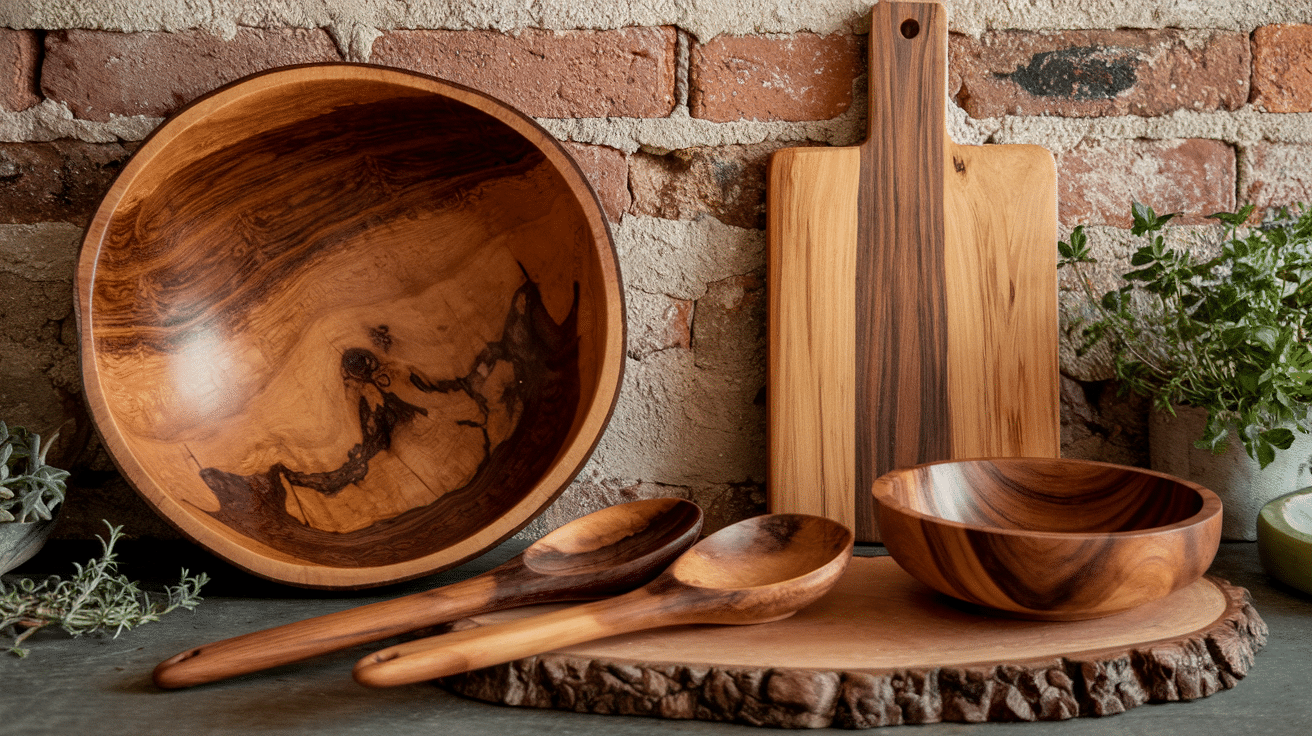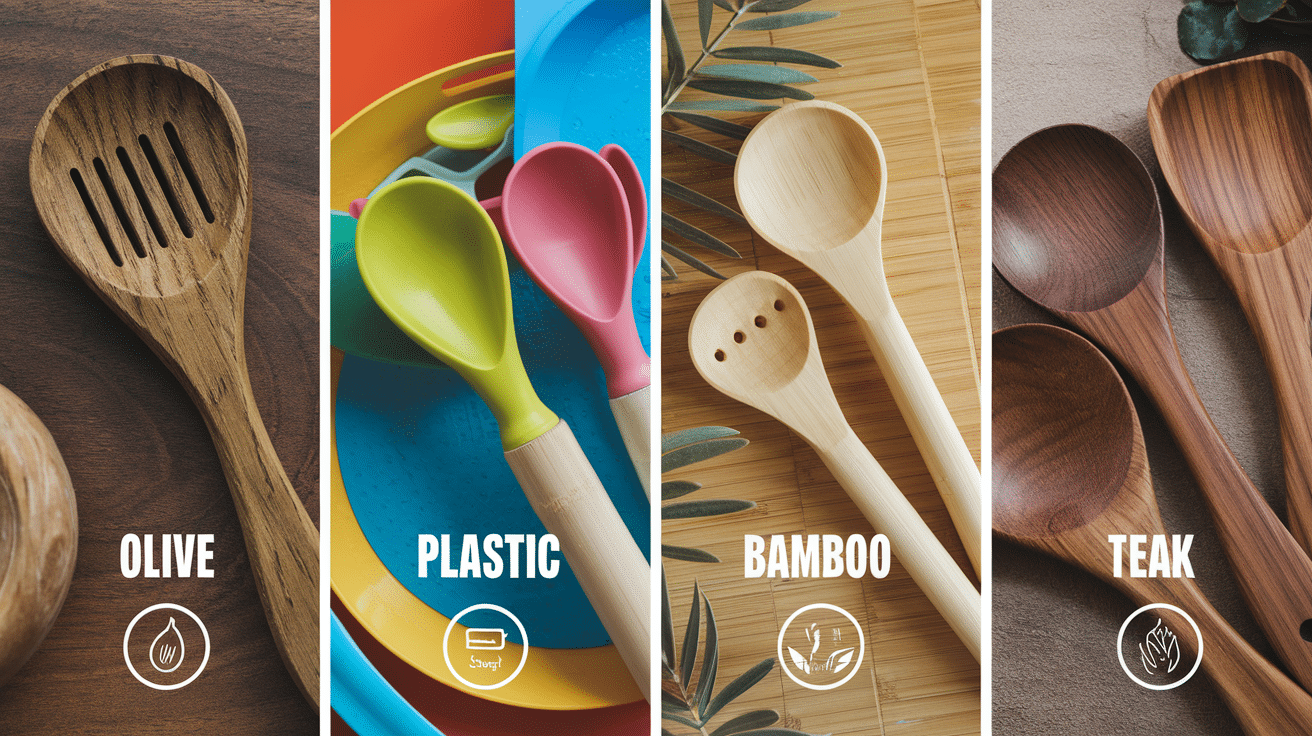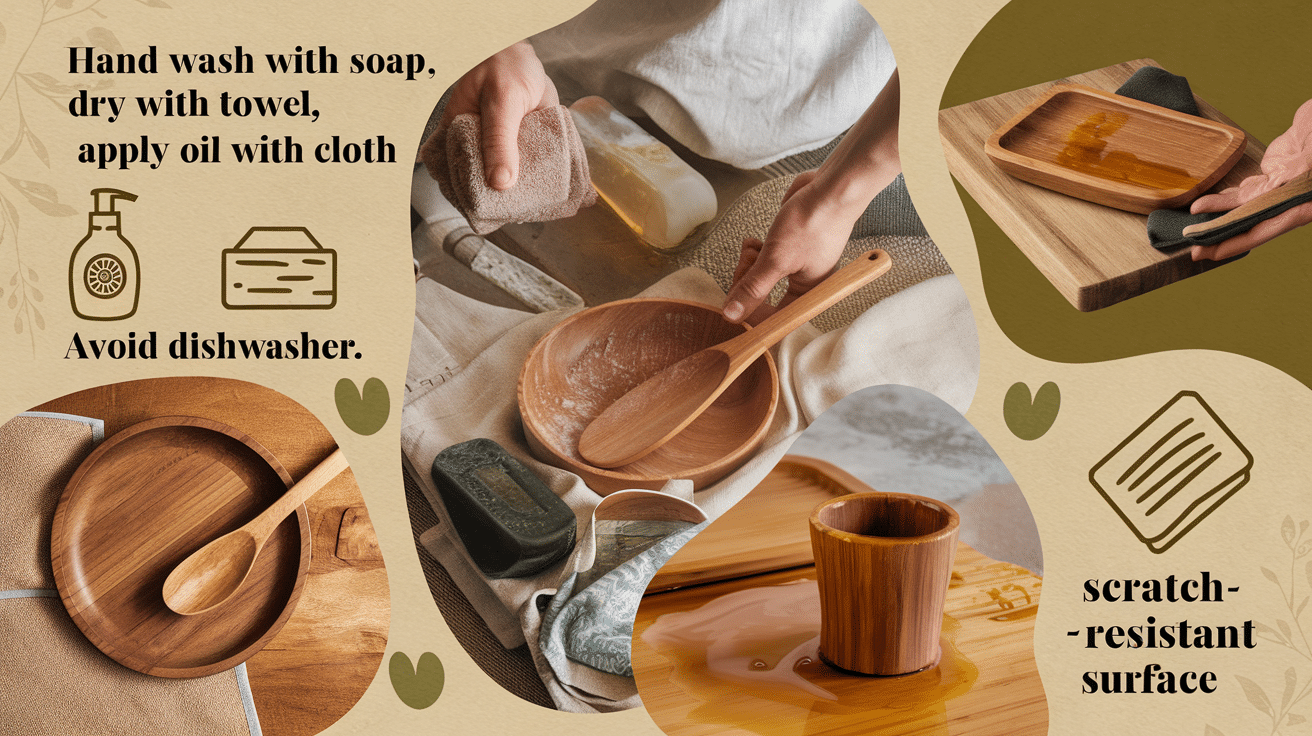Have you ever wondered why so many chefs love olive wood kitchenware? Step into a world where your kitchen tools aren’t just useful they’re special! Olive wood spoons, cutting boards, and bowls combine three amazing qualities that make them perfect for cooking.
Olive wood kitchenware is tough and long-lasting, showcases unique natural patterns, and comes from sustainable farming that’s kind to our planet.
Did you know? Archaeological digs have uncovered olive wood kitchen tools dating back to 4000 BCE, making it one of the oldest materials used continuously in cooking history!
If you’re flipping pancakes or serving salad, olive wood tools feel great in your hands. They don’t scratch your pans, naturally resist bacteria, and get even prettier with age. Ready to upgrade your kitchen with these natural treasures?
The Legacy of Olive Wood in Culinary Spaces
Did you know that olive wood has been a kitchen staple around the Mediterranean for thousands of years?
In ancient Greek and Roman homes, families treasured their olive wood utensils and bowls. Grandmothers passed down their favorite olive wood spoons to daughters, creating a chain of cooking history that stretched across generations.
What makes this tradition so cool is how it fits perfectly in today’s kitchens, too!
The same properties that made olive wood valuable centuries ago its natural strength, bacteria-fighting oils, and beautiful grain are exactly what modern cooks are looking for.
When you stir your pasta sauce with an olive wood spoon or chop veggies on an olive wood board, you’re connecting with an ancient cooking tradition.
But you’re also making a smart choice for your modern kitchen—combining old-world craftsmanship with today’s focus on sustainable, beautiful, and practical cooking tools.
What Makes Olive Wood the Best Choice for Kitchenware?

Olive wood combines centuries-old Mediterranean tradition with modern kitchen needs. Its natural antibacterial properties mean less worry about food contamination. Plus, the subtle hint of olive it imparts to food enhances flavors without overwhelming them.
Upgrade your dining experience with olive wood bowls and trays, where nature’s artistry meets functional elegance in every unique grain pattern that whispers of sun-drenched Mediterranean landscapes.
Durability That Lasts Generations
Want kitchenware that stands the test of time? Olive wood is your answer! Naturally dense and super tough, it resists damage while handling daily use without warping or splintering. Your olive wood spoons and bowls can become family heirlooms.
Aesthetic Appeal with a Story
Every olive wood piece tells a unique tale through its one-of-a-kind grain patterns. No two items look exactly alike! These beautiful swirls and markings bring a touch of rustic charm and natural warmth to any kitchen setup.
Sustainability Rooted in Nature
Love the planet? Olive wood kitchenware is eco-friendly! Craftspeople make these items from pruned branches or naturally fallen wood—not from cutting down whole trees. This supports responsible forestry practices and zero-waste craftsmanship.
Olive Wood VS Other Kitchen Materials

|
ASPECT |
OLIVE WOOD |
PLASTIC |
BAMBOO |
TEAK |
|---|---|---|---|---|
|
Longevity |
Extremely durable and resistant to cracking with proper care. |
Prone to warping and degrading over time, especially when exposed to heat. |
Decent lifespan but can splinter or crack over the years. |
Very durable and moisture-resistant, often used in premium kitchenware |
|
Safety |
Naturally antibacterial and chemical-free surface. |
It can leach harmful chemicals, especially if heated. |
Generally safe but may contain adhesives or glues in composite boards. |
Naturally resistant to bacteria and safe for food contact. |
|
Visual Appeal |
Unique swirling grain patterns offer rustic grace.. |
Available in bright colors but lacks natural beauty. |
Clean, modern look but with limited variation in pattern |
Rich golden-brown tones with smooth grain make it visually premium. |
|
Sustainability |
Harvested from pruned branches, making it eco-friendly and sustainable. |
Petroleum-based and non-biodegradable, not environmentally friendly. |
Fast-growing and renewable, but manufacturing can be energy-intensive |
Sustainably harvested teak is good, but overharvesting is a concern. |
Olive Wood Maintenance: Easy and Durable

Olive wood kitchenware and items are prized for their beautiful grain patterns and durability, but they do require some specific care to maintain their quality over time.
Cleaning
- Wash by hand with mild soap and warm water
- Never soak in water or put in the dishwasher
- Dry immediately and thoroughly after washing
- For stubborn food residue, use a gentle brush or scouring pad
Preservation
- Apply food-grade mineral oil or beeswax periodically (every 1-3 months)
- Rub oil in the direction of the grain and let it absorb for a few hours
- Wipe away any excess oil with a clean cloth
- This prevents cracking and maintains the wood’s natural luster
Natural Benefits
- Olive wood contains natural compounds that inhibit bacterial growth
- This makes it an excellent choice for cutting boards and serving utensils
- The dense grain structure resists knife marks and scratches
- With proper care, olive wood items can last for decades
Natural Distinction: Why Cork and Olive Wood Stand Apart
Natural materials that combine timeless craftsmanship with eco-conscious values. Experience premium quality that feels good to use and aligns with sustainable living principles.
Similar to Olive Wood, Cork is a sustainable material harvested from the bark of cork oak trees without harming them.
It’s prized for its unique combination of elasticity, impermeability, and lightweight durability, making it ideal for wine stoppers, flooring, and eco-friendly accessories.
Beauty That Boosts Everyday Use
Cork’s honey-toned warmth and olive wood’s striking grain patterns bring natural elegance to any space. Each piece displays a unique character that enhances both contemporary minimalist designs and traditional rustic aesthetics.
Durability You Can Count On
Despite their lightweight feel, both materials offer exceptional resilience. Cork maintains its elasticity and compression recovery for decades, while olive wood’s density provides remarkable scratch resistance and structural integrity that improves with age.
Sustainability with Substance
Cork bark harvesting preserves trees while providing a habitat for diverse species. Olive wood typically comes from trees no longer producing fruit, giving new purpose to these ancient specimens. Both materials biodegrade naturally at the end of their useful life, leaving minimal environmental impact.
Tactile Pleasure
The sensory experience of cork and olive wood creates an immediate connection. Cork’s gentle give and olive wood’s silky-smooth finish invite touch, creating a multisensory experience that plastic alternatives simply cannot match.
Temperature Stability
Both materials naturally regulate temperature, with cork providing excellent insulation and olive wood maintaining a comfortable feel regardless of ambient conditions—never too cold or too hot to handle.
Heritage and Tradition
These materials carry centuries of artisanal history. Mediterranean cultures have treasured olive wood for millennia, while cork harvesting traditions date back to ancient Roman times, connecting modern products to rich cultural legacies.
The Benefits of Cork and Olive Wood Products
- Sustainable harvesting – Cork bark preserves trees and supports biodiversity, while olive wood typically comes from non-productive trees, giving purpose to ancient specimens.
- Exceptional durability – Cork maintains elasticity for decades, while olive wood’s density provides remarkable scratch resistance that improves with age.
- Natural grace – Both materials bring distinctive beauty to any space with cork’s honey-toned warmth and olive wood’s striking grain patterns.
- Eco-conscious credentials – These biodegradable materials represent renewable resources that align perfectly with sustainable living principles.
- Practical luxury – These materials combine premium quality with environmental responsibility, offering everyday products that feel good to use with a clear conscience.
Summing It Up
Ready to alter your kitchen with heirloom-quality essentials?
Olive Wood Kitchenware delivers unmatched durability, natural beauty, and eco-consciousness that synthetic alternatives simply can’t match.
Your purchase represents intentional living—selecting items that align with your values while elevating everyday cooking rituals.
Choosing these sustainable materials isn’t merely acquiring kitchen tools; it’s embracing a lifestyle centered on mindful consumption and authentic experiences. Each piece becomes a cherished companion, developing character and patina with every use.
Look through Olive Wood collections and learn why generations of families treasure these sustainable investments.
Your kitchen deserves tools made with the same care you put into your cooking. Chop, serve, and savor—with olive wood, nature’s beauty meets kitchen magic!
